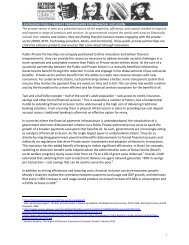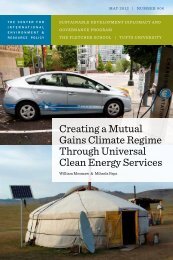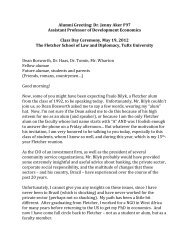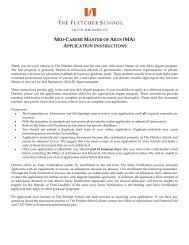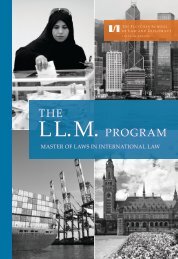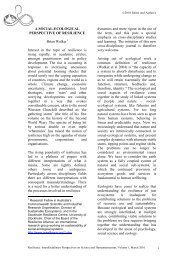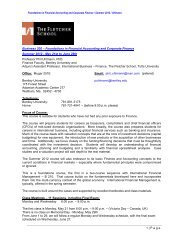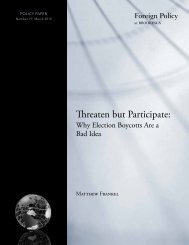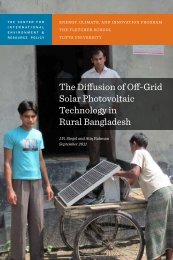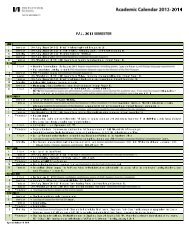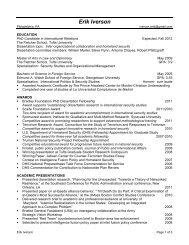A Case Study Analysis - Fletcher School of Law and Diplomacy
A Case Study Analysis - Fletcher School of Law and Diplomacy
A Case Study Analysis - Fletcher School of Law and Diplomacy
You also want an ePaper? Increase the reach of your titles
YUMPU automatically turns print PDFs into web optimized ePapers that Google loves.
10Despite a literacy rate <strong>of</strong> 97%, <strong>and</strong> an effective post-secondary educational system, the Mongolianworkforce lacks real world business experience, <strong>and</strong> a lack <strong>of</strong> integration into global financial networks:They think because they have an economics degree that they have a great underst<strong>and</strong>ing <strong>of</strong> howthe economy should function <strong>and</strong> have a great level <strong>of</strong> financial expertise, but it’s not reallyinformed by the kind <strong>of</strong> real world experience that you might see in another country, whereyou’ve got people coming back from overseas…there are no foreign banks here operating, it’s alllocal banks…no investment banks have <strong>of</strong>fices here, no foreign insurance companies, so it’s hardfor people here locally to learn when you don’t have that kind <strong>of</strong> base to learn from.The shortcomings <strong>of</strong> the Mongolian labor force demonstrate the lack <strong>of</strong> experience, or tacit knowledge,necessary to operate a complex institution in the financial sector.Despite this lack <strong>of</strong> resources, the interviewee believes that the most senior leadership <strong>of</strong> the Mongoliangovernment has the skills to secure the expertise <strong>and</strong> establish the fund. However, as Mongolia is ayoung <strong>and</strong> turbulent democracy, there is little political incentive to do so. Much to the chagrin <strong>of</strong>multilateral institutions, Mongolia’s first SWF, the Human Development Fund, was used for cashh<strong>and</strong>outs to citizens rather than long-term investment. This was not the result <strong>of</strong> a lack <strong>of</strong> know-how,rather, it was necessitated by the desire to stay in <strong>of</strong>fice, <strong>and</strong> secure votes. These cash h<strong>and</strong>outscontributed to the economy’s overheating (Ognon 2013), an ironic phenomenon given that many SWFsare created to prevent this phenomenon.The economic challenges the Government <strong>of</strong> Mongolia faces, commodity price instability, the need toavoid “Dutch Disease”, economic overheating, <strong>and</strong> desire to save natural resource wealth for futuregenerations, could all be addressed via the establishment <strong>of</strong> SWFs. And while Mongolia has beenadvised <strong>and</strong> intends to do this, significant geographic hurdles, including a lack <strong>of</strong> human capital, <strong>and</strong>domestic political challenges have thus far prevented SWFs from being implemented effectively.Trinidad <strong>and</strong> Tobago 11Trinidad <strong>and</strong> Tobago’s Heritage <strong>and</strong> Stabilization Fund (HSF) has faced geographic challenges similar tothose encountered in Mongolia. However, the development <strong>of</strong> the HSF demonstrates how smaller SWFsin frontier markets can effectively overcome these challenges. Trinidad <strong>and</strong> Tobago’s SWF began asinterim fund in 2000, <strong>and</strong> was formally launched as the HSF in 2007.11 Unless otherwise stated, quotes <strong>and</strong> facts in this section are sourced from a 2012 interview with Gov. EwartWilliams conducted by the <strong>Fletcher</strong> <strong>School</strong>’s Sovereign Wealth Fund Initiative. A full citation appears in thebibliography.



